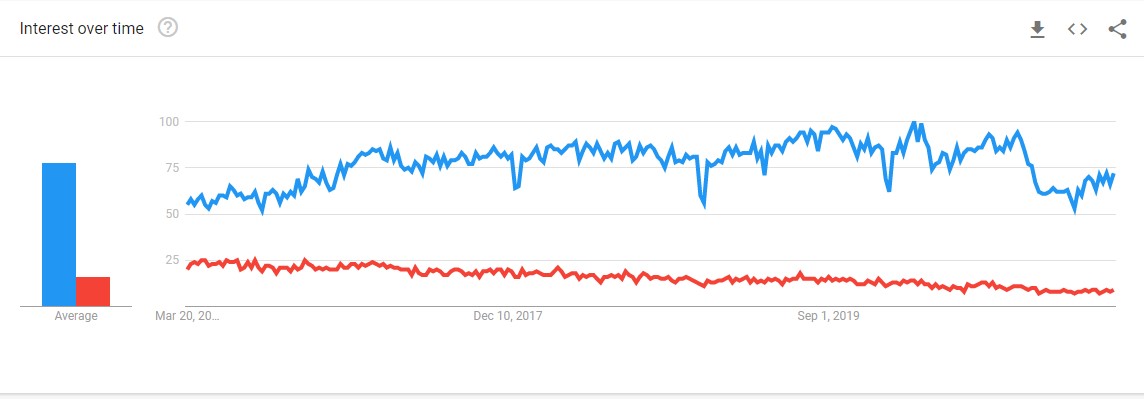PHP is an open-source scripting language widely used for developing websites and applications. Being one of the best PHP software development companies, we are frequently asked about the most used and user-friendly frameworks for web development in our company. Our PHP consultants have expertise in all PHP frameworks but, Laravel and CodeIgniter are loved by our PHP developers.
So, this blog will address the two trendiest PHP frameworks –Laravel and CodeIgniter which have been rising high in usage and popularity across the globe. We will try to address Laravel vs Codeigniter as well. Both are open-source frameworks and can build a secure, complex web application and both provide great results in web development. You need to consider several aspects before choosing the one.
Let’s check out what is Laravel and CodeIgniter? And what is in the plate when it comes to Laravel vs Codeigniter?
What is Laravel?
Laravel is a free open-source PHP framework that has inbuilt features for making web application development easier and faster. As it has a variety of compatible packages and extensions, software developers are adopting this framework for a streamlined development process. It is a reliable framework as it is expressive and follows accurate language rules. It supports MVC for development and is written in PHP.
Key Features of Laravel:
• Reusable Code
• Frequent Updates
• Clear Modular Structure
• Great Software tools
• Elaborate Integration Mechanism
• Faster Database Access
• Improved Performance
• Powerful Online Community
• Lots of libraries and modules
• Offers Authentication
• Smooth Migration
• Easy Unit Testing
• High-End Security
What is CodeIgniter?
CodeIgniter is an open-source powerful PHP framework used for developing PHP websites. It is free, easy-to-use, and offers a ready-to-use library. It is simple and provides easy to use tool for developing dynamic applications fast and efficiently. Moreover, it enables the addition of third-party plugins for implementing complex functionalities. Apart from superior stability, security and support, it provides clear and structured documentation and assists you with enhanced performance.
Key Features of CodeIgniter:
• Free to use
• Follows MVC pattern
• Lightweight
• Generates SEO friendly URLs
• Enables easier tweaking of database
• Data transfer without any error
• High-level efficiency
• Validation
• Great community support
• Easy and hassle-free migration
• Light in weight
Laravel vs. CodeIgniter: In-Depth Comparison
| Laravel | CodeIgniter | |
| Database Model | Object-Oriented | Relational Object-Oriented |
| Programming Paradigm | Event-Driven Functional | Component Driven |
| Routing | Explicit Routing | Supports both Explicit and Implicit |
| Built-in Modules | Divides project into small modules and can be reused | Doesn’t support built-in modules |
| Support for RESTful API | Provides APIs without spending extra time | Doesn’t provide a streamlined approach for REST APIs |
| Template Language | Blade Template Engine | PHP Proprietary |
| Learning Curve | Difficult to learn for beginners | Easy to learn |
| Companies using | 9GAG, Union | Buffer, Manchester |
| Structure and Updates | Follows MVC structure and comes with the command line argument called Artisan | The structure is MVC and loosely based on object-oriented programming |
| Template Engine | It comes with a robust template engine called Blade | Code-Igniter doesn’t have any built-in template engine |
| Libraries | It has its official document | It has lots of built-in functionality. |
The Popularity of Laravel vs. CodeIgniter
Google Trends: Laravel vs. CodeIgniter
With the interest over time, the Laravel PHP framework is on the brighter side compared to CodeIgniter.

Statistics
• According to Builtwithtrends, there are around 1,232,451 websites developed in Laravel.
• According to Builtwithtrends, there are around 1,410,088 websites developed in Code Igniter
GitHub Stars
• Laravel has 64.1k stars and 20.5 k Forks on Github
• Code Igniter has 18.1k stars and 7.8k Forks on Github.
When to use Laravel and CodeIgniter?
Laravel
Laravel scores better compared to other PHP frameworks. It is not only used to build websites but also web apps which is based on MVC architecture and object-oriented programming. From a one-page website to a social network website, you can develop any type of simple to complex website in Laravel. Some of the project requirement includes:-
• ORM/PDO
• Template Engine
• RESTful API
• Logging
• Mail
• Database Management
Code-Igniter
CodeIgniter is a toolkit to build applications rapidly in a PHP framework.
• CodeIgniter is a good option to develop large and small application both.
• If you are looking to create a business web application, then CodeIgniter is the best option.
• If you want to develop a small website and want to have clear documentation, then even CodeIgniter is the best option.
• If you have little knowledge about technical aspects, choose CodeIgniter
You can use pre-existing components such as email, session management, and database management to embed basic functions into your customizable application. Websites developed using CodeIgniter load faster and occupy less space compared to other frameworks.
Laravel vs. CodeIgniter: Which is better?
Laravel and CodeIgniter both are the best PHP frameworks for web development. Choosing the one depends on your requirements, budget, size of the company, and many other factors. Laravel is loved by developers due to its coding patterns and robust application development in no time. However, learning Laravel is a bit tough compared to CodeIgniter. CodeIgniter is easy to grasp and best for projects which don’t require additional features.
If you have still any doubt on which framework is better for your web application? You can connect with our PHP consultants who have a great level of expertise in developing the custom PHP application as per your requirements. Accrete is one of the top PHP software development companies providing diverse solutions and services across the globe. With efficient project management practices and flexible engagement models, we strive hard to provide customer satisfaction.